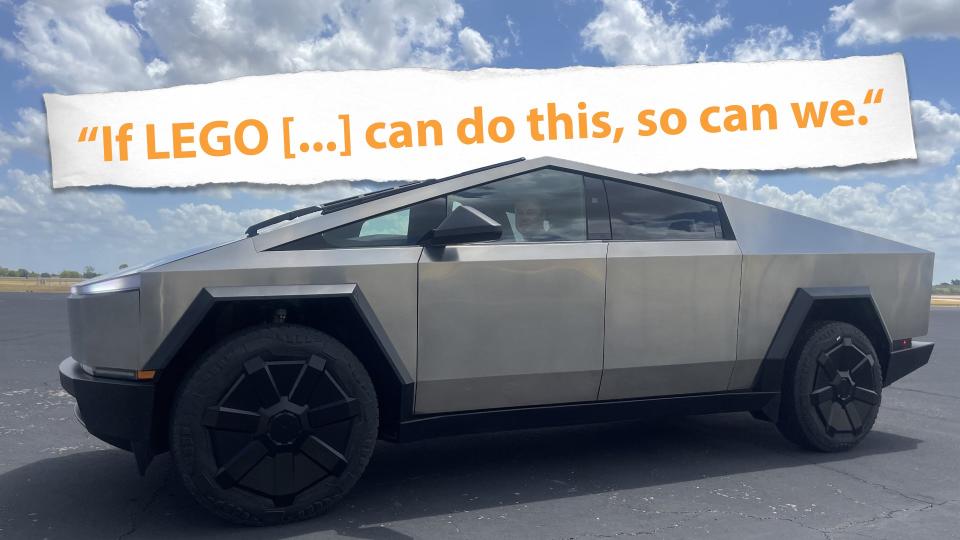Musk Demands ‘Sub 10-Micron Accuracy’ for Tesla Cybertruck Build Quality in Leaked Email

Nearly four years after it was originally revealed, the Tesla Cybertruck is finally nearing launch. The automaker recently built a production candidate of the vehicle at its Austin, Texas facility, meaning that the truck is entering the last phases prior to customer delivery. In this home stretch, Tesla CEO Elon Musk has called on employees to ensure that the build quality of the Cybertruck leaps above and beyond the company's prior standards.
In fact, according to a leaked email published by Cybertruck Owners Club, Musk is requesting tolerances—the allowable deviation of any component from its desired design—below 10 microns for all parts used in the vehicle's final assembly. That's equivalent to one hundredth of a millimeter.

"Due to the nature of Cybertruck, which is made of bright metal with mostly straight edges, any dimensional variation shows up like a sore thumb," Musk's email reads. "All parts for this vehicle, whether internal or from suppliers, need to be designed and built to sub 10 micron accuracy."
He continues: "That means all part dimensions need to be to the third decimal place in millimeters and tolerances need be specified in single digit microns. If LEGO and soda cans, which are very low cost, can do this, so can we. Precision predicates perfectionism."
Now, measuring for precision in just about any manufacturing industry is very achievable. The problem is that tighter tolerances often equate to a more expensive product, and the tolerances that Musk is calling for equate to about half the diameter of human hair. For reference, Bugatti uses 3D scanners following assembly of its multi-million-dollar hypercars to validate tolerances down to 5 microns.
The more precise something is, the more difficult it can be to achieve reliably. In the manufacturing world, both of those attributes can be expensive to accomplish.
From a tooling perspective, precise equipment is expensive in general. But consumable items—like stamping dies and machining tools—can wear out and require replacement. Large amounts of waste may be produced as parts become increasingly out-of-spec, requiring tooling replacement to rectify. An example might be replacing a casting mold, something Tesla already does regularly when building its cars today. It's also difficult to affordably achieve micron-level accuracy with manufacturing techniques such as laser cutting, which is how Tesla once said it would score the sheet metal of the Cybertruck's exoskeleton so it could be folded like "origami."
Labor is another area where precision can become expensive. A production line can only output so many vehicles in a day, and the most limiting factor is often the human element. If people work faster, the work may be less precise. And if there are techs at the end of the assembly line checking for tolerances and other various quality control deliverables, those out-of-spec vehicles may quickly pile up for repair before they leave the lot.
Granted, it's very unlikely that Tesla will be measuring panel gaps with a micrometer and expect tolerances under 10 microns, but it would appear that Musk is calling for perfection with general part dimensions. That means upstream providers or production lines may be the ones responsible for doing this with bolts, screws, and other components used during final production.
https://twitter.com/elonmusk/status/1694403816920137880
Tesla doesn't exactly have a glowing reputation for precision and perfection today. Its quality control has been a longstanding problem, and while it has certainly improved, vehicles are still arriving with imperfections like panel gaps and paint chips that are considered to be in-spec as long as they're under 2 millimeters in diameter. In fact, the Tesla community has taken pre-delivery quality inspections into its own hands, even building checklists and web apps to help with the process.
To see Tesla looking to improve upon this is definitely a step in the right direction. But there's something to be said about being realistic in such efforts, and Musk has called for similar quality improvements in the past, with results that still aren't ideal today.
Either way, the Cybertruck is due to hit the streets soon. Tesla is aiming for its first delivery event to take place by the end of the quarter, which ends in just over a month. The automaker recently added an invitation to the delivery event as a referral reward to its app, per Electrek, though a hard date has not been revealed for the event or first deliveries.
Got a tip or question for the author? Contact them directly: rob@thedrive.com

 Yahoo Autos
Yahoo Autos 